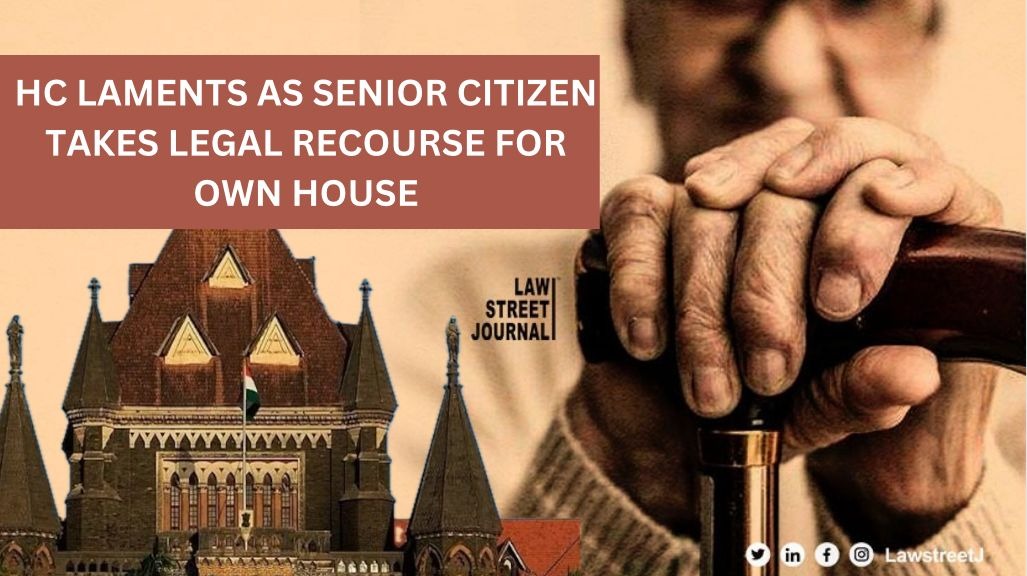MUMBAI:The Bombay High Court recently passed a significant judgement coming to the aid of a senior citizen who was illegally ousted from her own home by her son.
Expressing utmost sympathy to her, Justices GS Kulkarni and Firdosh P Pooniwalla said that it was most unfortunate that the mother in the twilight years of her life, after her husband had passed away, instead of receiving love, affection, care and empathy from her sons and their family members (barring the eldest son), was required to take recourse to legal proceedings.
The feeling of being disowned by one of her sons itself has caused her trauma. None of the parents should suffer this way. In ones life, there is much more than material things. Proud would be the parents of such children who would have their own achievements on all fronts and not look at the wealth and money of their old parents. However, litigation which has reached the Courts, would show that the world cannot so idealistic, as human greed is a bottomless pit. This is certainly neither the stage in life or the age of the mother, that she should suffer on such cause. It is for such reason, the legislature in recognising the rights of the senior citizens and to protect their rights, have framed the Senior Citizens Act.
The Court was hearing an appeal which challenged an order passed by the Senior Citizens Maintenance Tribunal directing the son (petitioner) to vacate his mothers residence.
The High Court, at the offset, lamented on how an elderly citizen was forced to come to court.
An unfortunate saga of a mother, who is a senior citizen, requiring to initiate proceedings against her son and his wife, who illegally ousted her from her abode, is the subject matter of the present proceedings.
The petitioner told the bench that he had suffered a paralytic attack in the year 2019 for which he was hospitalized. Now, he is a disabled person and without an employment. He also contended that he is dependent on his wife, who is doing small works and which is the only source of the income.
On these grounds, the Tribunals order needed to be set aside and him along with his wife ought to be permitted to reside in the said tenement.
The mother contended that the motive of the petitioner to illegally oust her so as to exclusively occupy her tenement with an intention to grab the tenement that too during her life time and to the exclusion of the other siblings of the petitioner. She contended that by fabricating documents, the petitioner intended to sell the tenement.
The Court looked into the intent and objective of the Maintenance and Welfare of Parents and Senior Citizens Act, 2007
The object and intention of the act is to make provisions for maintenance and welfare of the parents and senior citizens guaranteed and recognized under the Constitution. The Statement of objects and reasons of the enactment clearly set out the intention behind the legislation recognizing the core human values of empathy, namely, that the traditional norms and values of the Indian Society laid stress on providing care for the elderly. However, due to withering of the joint family system, a large number of elderly are not being looked after by their family, consequently, many older persons, particularly widowed women are now forced to spend their twilight years all alone and are exposed to emotional neglect and to lack of physical and financial support. That ageing has become a major social challenge and there is a need to give more attention to the care and protection for the older persons.
Though the parents can claim maintenance under the Code of Criminal Procedure, 1973, the procedure is both time-consuming as well as expensive. And, with this solemn intention, the Parliament has enacted the Senior Citizens Act, the court elaborated.
It is thus seen from the legislative scheme of Senior Citizens Act that it provides for complete mechanism so as to achieve the object and intention of the legislation to recognize the rights of the senior citizens and their maintenance and welfare.
Referring to various top court decisions, the court concluded that during the life time of the parents, the children cannot assert any legal right whatsoever in respect of the property of their parents claiming exclusive ownership or possession of the parents property. The proper remedy for the petitioner would be to file a suit in the event the other brothers are also claiming any right in the premises and this cannot be during the life time of the mother.
The court also rejected the petitioner's argument that Section 16 of the Senior Citizen's Act is arbitrary as it doesn't provide for appeal by anyone other than the senior citizens against order of the Tribunal. The court said that the provision does not become bad merely because the petitioner feels so.
The right to appeal must be conferred by law and the legislature, in its wisdom, has chosen to limit the right of appeal to senior citizens, the court observed.








![Husband Can Also Claim Alimony/Maintenance From Wife: Bombay High Court Orders Woman To Pay Alimony To Ex-Husband [Read Order]](/secure/uploads/2022/04/lj_2823_Divorce.jpg)






